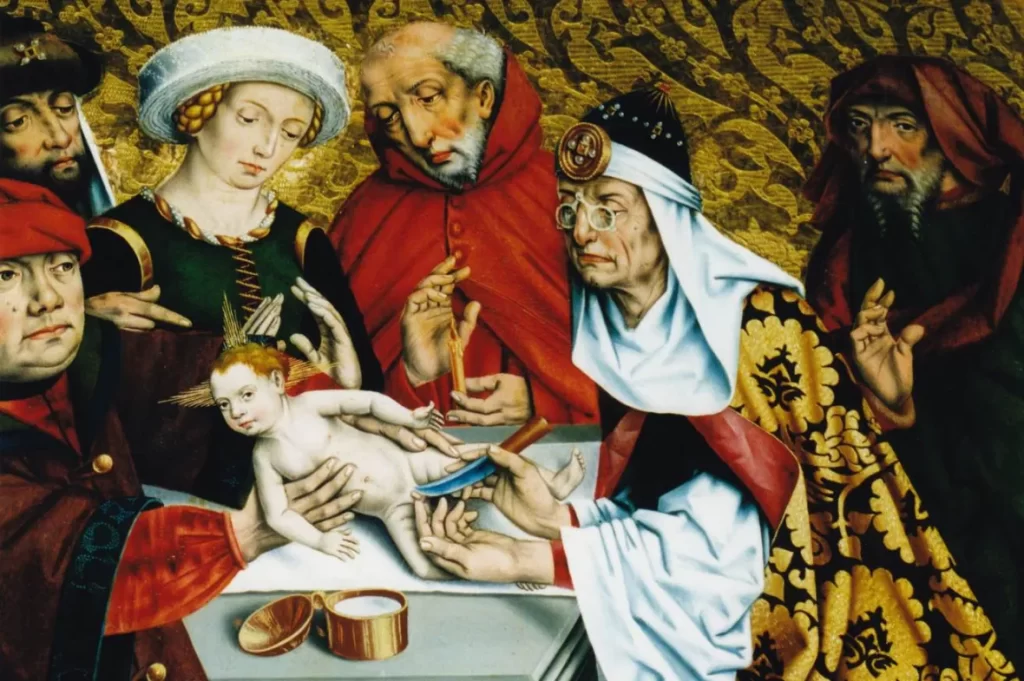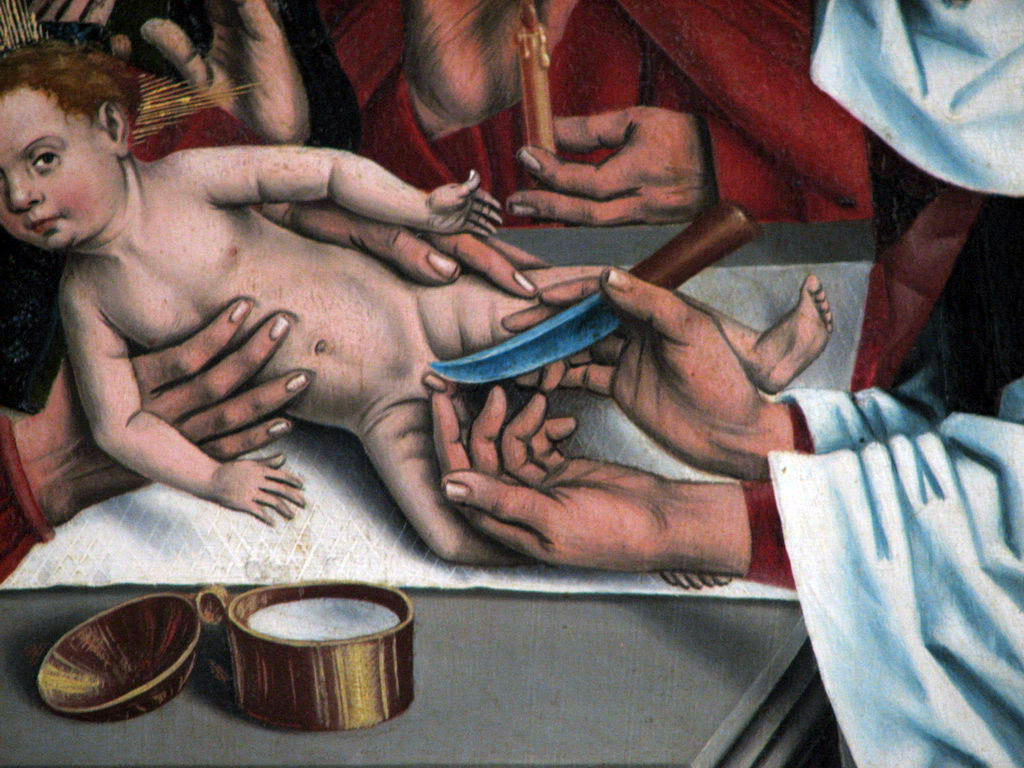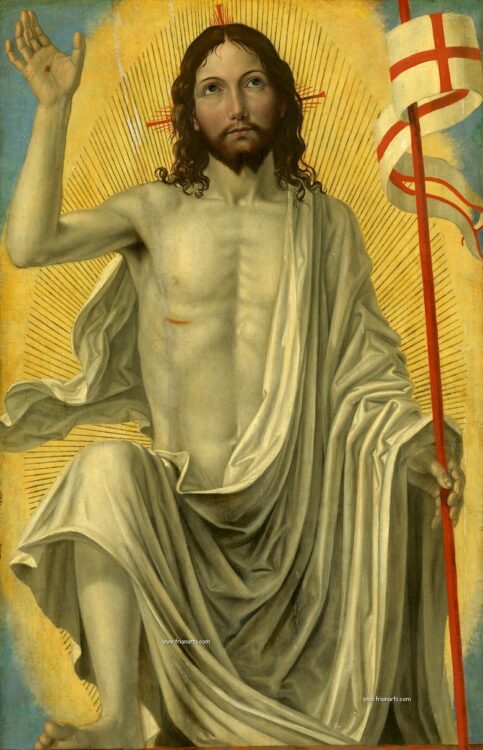Sermon on the Circumcision and Name of Jesus. January 1, 2017
Texts: Galatians 4:4-7
4 But when the fullness of time had come, God sent his Son, born of a woman, born under the law, 5 in order to redeem those who were under the law, so that we might receive adoption as children. 6 And because you are children, God has sent the Spirit of his Son into our[b] hearts, crying, “Abba! Father!” 7 So you are no longer a slave but a child, and if a child then also an heir, through God.
Luke 2:21
21 After eight days had passed, it was time to circumcise the child; and he was called Jesus, the name given by the angel before he was conceived in the womb.
Liturgical note: The Feast of the Circumcision and Name of Jesus was observed in the Western European calendar and remains on Lutheran and Anglican calendars. In the Roman Catholic calendar January 1 is historically the Solemnity of Mary, the Mother of God.
SERMON
You’ve probably heard the slogan, “The gift that keeps on giving.” It’s been used in a number of ads. I googled the expression and found out that it was first used to advertise the phonograph in 1924. This made sense. If you liked listening to a piece of music, you could hear it over and over again on a phonograph record. The fifty year copyright limit ran out and so the slogan is in public domain and no one has filed to use it exclusively for their product. So I appropriate it for this sermon. Christ is the Gift that God keeps on giving.
In these days of Christmas we celebrate the coming of Christ into the world as an infant. We think of the Christ-child as God’s gift to the world. On this day in the church year calendar our attention is called to the circumcision of Jesus eight days after his birth, according to the custom of the Jewish people.
The rite of circumcision of incorporated Jewish males into the covenant with Abraham. It’s a rite practiced also by Muslims, who also look to Abraham as the father of faith—as well as by other peoples around the world as a rite of initiation, one that modern Westerners might look down on as barbarous. Of course, until recently circumcision was performed routinely on American boys. The arguments that this had health benefits have been largely discredited. Some hospitals in the U.S. ban routine medical circumcision. But circumcision wasn’t performed on Jewish babies for health reasons. It was performed because God commanded it and it was a mark of identity. If you were a Jewish male and wanted to know if you were included in the covenant between God and Abraham, all you had to do was look down at your penis.

In any event, it was a traditional ritual that was performed on the Christ-child. It made him a part of the covenant community of God’s people. It’s one of the most telling signs of what has been called “the scandal of particularity”—that the incarnate Son of God was a Jewish male named Jesus.
Christmas more broadly considered is about the incarnation. I turn today to St. Paul’s Letter to the Galatians. This is not a part of the Bible that the popular imagination usually associates with the Christmas season, but if you want a brief summary of the main message of Christmas, the few verses we heard read from it are probably about as good as you can find.
These verses reflect on the nature of the incarnation, and give us some insights into both what it meant for God to become human, and what it means for us. The theological term “incarnation” refers to the act of becoming present in a body, or becoming a person with a body. Literally, it means “enfleshment.” We might say “embodiment.”
Some people get incarnation confused with reincarnation. Re‑incarnation refers to being incarnated in another body after having been incarnated in a previous one in a previous life. It means receiving a new incarnation, becoming present in a new body. That’s a view associated with Eastern religions such as Hinduism and Buddhism. (Actually, Buddhists seek the enlightenment that will free the soul from suffering endless reincarnations.) Christians don’t believe in reincarnation. We believe that God created us as living, breathing, unique bodies and that God will recreate us as living, breathing, unique bodies in the resurrection of the dead.
So when we speak of God becoming incarnate in Jesus, we are talking about God becoming present among us in bodily form as a human being. The specific human being God becomes incarnate in is named Jesus, and we commemorate his naming today along with his circumcision. Like any name, it identifies him as a person and it’s the name we can use to call out to him. And this baby named Jesus was a Jewish male who was incorporated into God’s covenant with this people by the rite of circumcision.
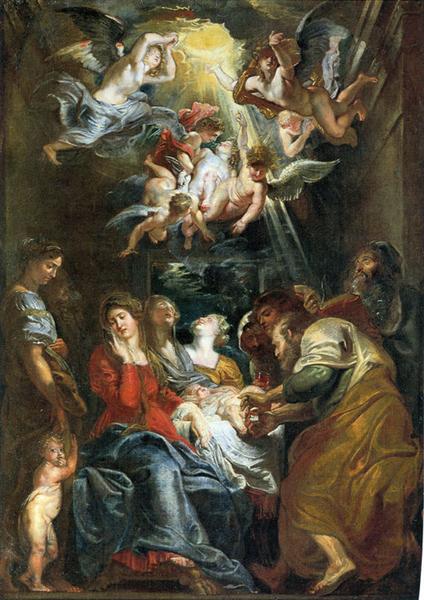
God can and does exist without a body. God is Spirit. God as spirit is a form that we cannot touch or see. But we are saying that in Jesus, God has become fully present in a human body, in a form that is not only touchable and visible, but which is subject to all the limitations and vulnerabilities that we, as incarnate people, are subject to.
This is precisely what is described in the verses we heard from Paul: “When the fullness of time had come”—the right time—, “God sent his Son”—someone who could truly represent him, “born of a woman”—in other words, born in the usual way, “born under the law”—the Law God had given to his people through Moses, “in order to redeem those who were under the law”—to set free those who were captive to sin and death, “so that we might receive adoption as children”—to become God’s children.
Even before we begin to think about why God might have done this, or what impact it might have on us, we have to admit that this is an extraordinary claim. The biggest miracle of the Christmas stories is not that a virgin became pregnant, but that God became incarnate. A lot of people get tripped up over the virgin birth. Actually, with today’s technology, a virgin becoming pregnant is not a miracle at all. It requires nothing more than a simple little medical procedure. But God becoming incarnate is analogous to the medical practitioner not just impregnating the virgin, but turning himself into an unborn baby and placing himself in her womb, and wagering his whole future on the hope that she won’t miscarry or abort him.
When God becomes a human being — becomes incarnate — God is voluntarily exposed to the same fears and risks and dangers that the rest of us face. Maybe we don’t think about that, but if Christ could die on the cross he could die at any point previous to that. In birth, God is exposed to the risks of a fatal complication. In childhood, God is exposed to the risks of childhood accidents and diseases. Even a routine surgery like circumcision, cutting the foreskin of the penis, is not without risks.
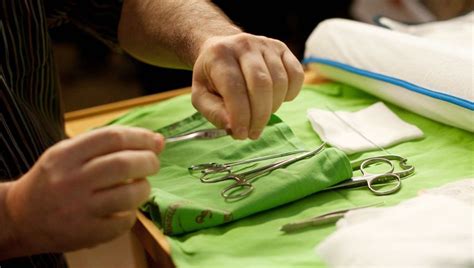
Throughout his incarnate life, God was exposed to the violence, the humiliation, of living under the heel of hostile occupational forces, even to the fear of terrorist attack from the Zealots. Throughout a human life in relationship with other human beings, God was exposed to the risks of being misunderstood, of being rejected, of being betrayed, of being falsely accused, and of being eliminated as a threat to the powers that be. Well, actually, that’s exactly what happened.
You can’t express the totality of the Son of God’s human life more concretely than the event we commemorate today – the circumcision of the baby Jesus eight days after his birth. We can focus on the spiritual aspect of this ritual: Jesus was included in the covenant God made with the Jewish people as a descendant of Abraham. But the spiritual aspect of circumcision is inseparable from the physical sign of the removal of the foreskin on the penis. That little surgery became the first blood that Christ shed for us.
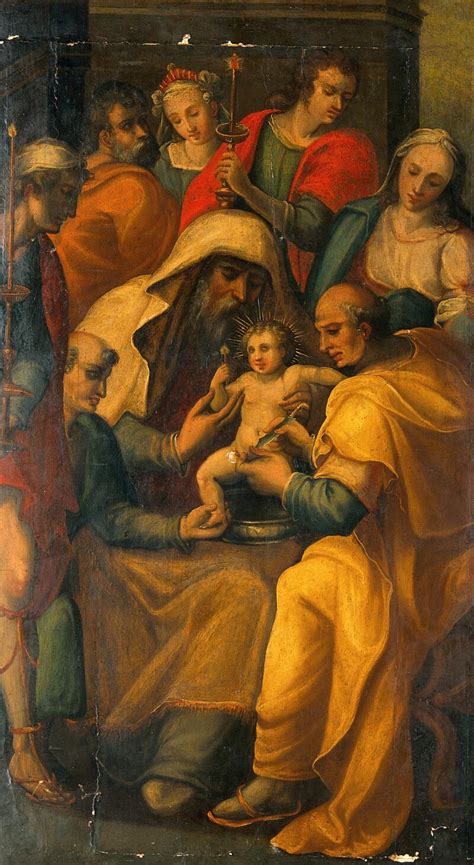
The incarnation is utterly amazing in itself. But the next question is “why?” Paul addresses this question in the next verse and then elaborates on what it means for us. He says that God sent the Son into such circumstances so that he could get everyone else out of them. And then in elaborating, he puts it in family terms. The Son did what he did in order that we might have the opportunity to be adopted into God’s family.
Now the Jewish people were already part of God’s family. They were people of the covenant. So Paul is really addressing the gentiles in this letter, which means most of us. Paul wants us to understand that this adoption applies to all people. We are now God’s children because the Spirit of God’s child Jesus has been sent into our hearts.
This phrase “into our hearts” stands out for me because in Romans Paul sees this as the fulfillment of what circumcision was really about. Moses said in Deuteronomy 30:6, “And the Lord God will circumcise your heart and the heart of your descendants, so that you will love the Lord your God with all your heart and with all your soul, in order that you may live.” Paul writes to the Romans (a congregation composed of Jews and gentiles), “Circumcision is indeed of value if you obey the law; but if you break the law, your circumcision has become undone” (2:26). In other words, circumcision is of no value if it doesn’t lead to loving God with all your heart.
Not surprisingly, Paul came to see Holy Baptism as the new circumcision available to all people, not only to the Jews. But in this act God also connects with us through the body. As bodily creatures there is no other way for God to get ahold of us except through the body. We can’t become so spiritual that we no longer relate to God through our bodies.
In Baptism we have received the Spirit of Christ, the spirit of adoption. And, says Paul, this changes everything because as God’s children, you are no longer at the beck and call of the things that once dictated your every move. We no longer have to go with the cultural flow and slavishly do whatever the world around us prescribes for us to do. Life can be different for us now, because we have become children of God, and as God’s children we will receive from God all that has been kept in trust for his children.
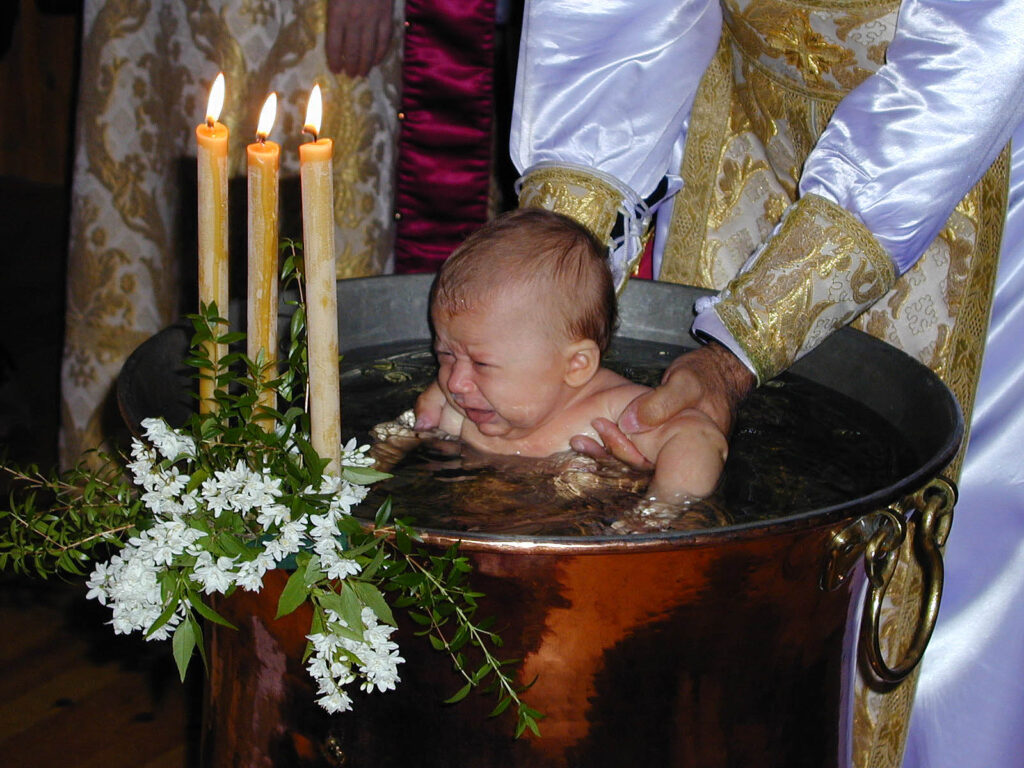
Jesus was born under the thumb of the same pressures and constraints as we are. But he came into this life, if not to give us a way out. then to deal with it as children of God. When God became incarnate in Jesus, he put himself into our hands, placed himself at our mercy, so that we could put ourselves into God’s hands and receive God’s mercy. We did the worst we could do to him, but Jesus never fell out of God’s hands. And now the crucified and risen Jesus becomes the gift of God that keeps on giving every time we celebrate Holy Communion. For in this meal we receive the benefits of his incarnational life and death: forgiveness of sins, life and salvation.
At this table Jesus comes to us as bread and wine. As often as we do this meal, we receive the body of Christ into our own bodies and become connected with his incarnate body in our very own biochemistry. Through the sacraments that Christ himself has instituted we know ourselves for sure as God’s beloved children who can cry out to our God as Abba, Father, just as Jesus did, because we are God’s own children, of the same flesh and spirit as God’s own Son Jesus. Amen.
– Pastor Frank C. Senn
